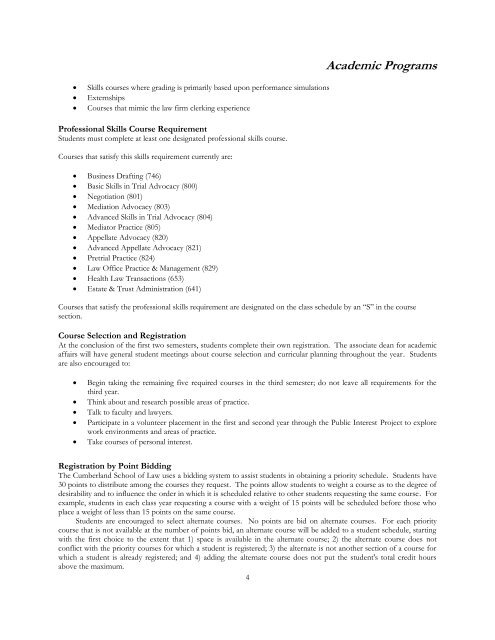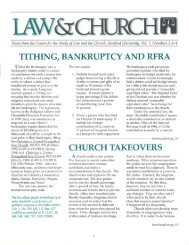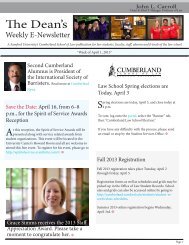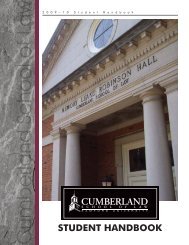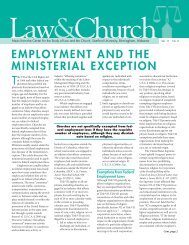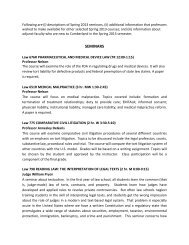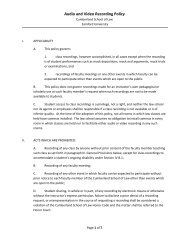STUDENT HANDBOOK - Cumberland School of Law - Samford ...
STUDENT HANDBOOK - Cumberland School of Law - Samford ...
STUDENT HANDBOOK - Cumberland School of Law - Samford ...
Create successful ePaper yourself
Turn your PDF publications into a flip-book with our unique Google optimized e-Paper software.
Skills courses where grading is primarily based upon performance simulations<br />
Externships<br />
Courses that mimic the law firm clerking experience<br />
Pr<strong>of</strong>essional Skills Course Requirement<br />
Students must complete at least one designated pr<strong>of</strong>essional skills course.<br />
Courses that satisfy this skills requirement currently are:<br />
Business Drafting (746)<br />
Basic Skills in Trial Advocacy (800)<br />
Negotiation (801)<br />
Mediation Advocacy (803)<br />
Advanced Skills in Trial Advocacy (804)<br />
Mediator Practice (805)<br />
Appellate Advocacy (820)<br />
Advanced Appellate Advocacy (821)<br />
Pretrial Practice (824)<br />
<strong>Law</strong> Office Practice & Management (829)<br />
Health <strong>Law</strong> Transactions (653)<br />
Estate & Trust Administration (641)<br />
Academic Programs<br />
Courses that satisfy the pr<strong>of</strong>essional skills requirement are designated on the class schedule by an “S” in the course<br />
section.<br />
Course Selection and Registration<br />
At the conclusion <strong>of</strong> the first two semesters, students complete their own registration. The associate dean for academic<br />
affairs will have general student meetings about course selection and curricular planning throughout the year. Students<br />
are also encouraged to:<br />
Begin taking the remaining five required courses in the third semester; do not leave all requirements for the<br />
third year.<br />
Think about and research possible areas <strong>of</strong> practice.<br />
Talk to faculty and lawyers.<br />
Participate in a volunteer placement in the first and second year through the Public Interest Project to explore<br />
work environments and areas <strong>of</strong> practice.<br />
Take courses <strong>of</strong> personal interest.<br />
Registration by Point Bidding<br />
The <strong>Cumberland</strong> <strong>School</strong> <strong>of</strong> <strong>Law</strong> uses a bidding system to assist students in obtaining a priority schedule. Students have<br />
30 points to distribute among the courses they request. The points allow students to weight a course as to the degree <strong>of</strong><br />
desirability and to influence the order in which it is scheduled relative to other students requesting the same course. For<br />
example, students in each class year requesting a course with a weight <strong>of</strong> 15 points will be scheduled before those who<br />
place a weight <strong>of</strong> less than 15 points on the same course.<br />
Students are encouraged to select alternate courses. No points are bid on alternate courses. For each priority<br />
course that is not available at the number <strong>of</strong> points bid, an alternate course will be added to a student schedule, starting<br />
with the first choice to the extent that 1) space is available in the alternate course; 2) the alternate course does not<br />
conflict with the priority courses for which a student is registered; 3) the alternate is not another section <strong>of</strong> a course for<br />
which a student is already registered; and 4) adding the alternate course does not put the student's total credit hours<br />
above the maximum.<br />
4


